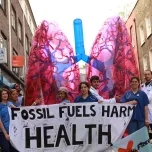Are you an academic or health professional working on sustainable healthcare or environmental health? Would you be able to help healthcare students engage with "the greatest threat to global health of the 21st century", and take action within their communities, nationally, and internationally, for a healthier future?
Healthy Planet UK is working with Medsin this Autumn to enable health students to educate, advocate and act on the health burden of the fossil fuel economy. We are looking for interested staff to help students in universities across the UK to support this project.
Medsin’s vision for “a fair and just world in which equity in health is a reality for all” is profoundly challenged by our current economic dependence on fossil fuels. Fossil fuel-associated health inequities play out on local and global scales. In the UK, low socio-economic status populations and areas with the lowest rates of car ownership are those who suffer most from the health burdens of air pollution and road traffic injuries. In North America, indigenous American and Canadian communities and their lands suffer disproportionately from oil pipeline and oil sands developments. And globally, climate change is a contributing factor to numerous health inequities around the globe, with its health impacts hitting hardest those regions least responsible for historical carbon emissions. Having a deeper understanding of environmental and climate justice and advocating for climate action has a key role in addressing health inequalities and stimulating meaningful social and political change.
The project aims to provide opportunities for education, advocacy, and action on local and global health issues, because the fossil fuel economy is at once a local and global health threat. In particular, we hope that divestment and local environmental justice campaigning will help Medsin branches to expand their network into their local community by working with other local groups trying to create more sustainable communities. Through Medsin's other activities, there is tremendous scope to explore climate change’s unique role as a “threat multiplier” for a host of associated vulnerabilities – e.g. considering how gender inequities result in climate change posing a disproportionate threat to women, climate change as a driver of conflict and forced migration, the climate cobenefits of improved sexual and reproductive health, the high carbon footprint of the pharmaceutical industry, or the mental health burden of drought, food insecurity, and complex climate-change-driven emergencies.
We hope that Medsin branches will be able to: hold educational events on fossil fuels, climate change and health; advocate for local and national health sector organisations to divest from fossil fuels, and explore opportunities for policy advocacy in advance of the COP21 summit in Paris this December; and to put their knowledge of the health benefits of climate change action into practice through advocating for better active transport infrastructure, a reduction in air pollution, more green spaces and availability of locally grown food in their communities, building links with local community organisations working on issues in their area.
If you would like to help students in your institution get involved, please get in touch with us at Healthy Planet - email healthyplanet@medsin.org, or find us on Facebook or Twitter.

Please log in or sign up to comment.